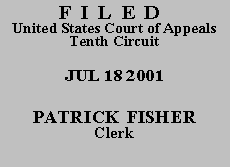

| UNITED STATES OF AMERICA,
Plaintiff-Appellee, v. CHRIS BUTLER, Defendant-Appellant. |
|
Defendant pled guilty to two offenses, one a drug-related conspiracy, the other the attempted intimidation of a witness. The district court sentenced him to 204 months in prison on the former conviction, and a concurrent 120 months on the latter. Defendant challenges two aspects of his sentence.
First, he claims the district court committed plain error when it added three points to his criminal history calculation for a prior state court conviction. Relying on United States Sentencing Commission, Guideline Manual, § 4A1.2(j), he contends that since his state conviction was later expunged, it should not be counted in determining his criminal history.
Defendant concedes that controlling precedent from this court authorized the district court to include his prior state court conviction in calculating his criminal history. See United States v. Hines, 133 F.3d 1360, 1363 (10th Cir. 1998). Under the federal sentencing guidelines, as defendant acknowledges, prior convictions that are set aside or pardoned "for reasons unrelated to innocence or errors of law, e.g., in order to restore civil rights or to remove the stigma associated with a criminal conviction," are counted. USSG § 4A1.2, comment (n.10). In counting the prior conviction, the district court specifically found that the purpose of defendant's expungement was to remove the stigma of a criminal conviction and restore his civil rights.
In Hines, we said that "a state's use of the term 'expunge' is not controlling in determining whether a conviction is properly included in calculating a defendant's criminal history category." Hines, 133 F.3d at 1363. "Instead, sentencing courts are to examine the grounds upon which a defendant was pardoned or his sentence was set aside or expunged." Id. This is exactly what the district court did here.
Defendant urges us to overrule Hines and other Tenth Circuit cases preceding and following Hines. We are unable to consider such a request. Absent an intervening, contrary decision of the Supreme Court, one circuit panel cannot overrule the decision of another panel, without express authorization from the en banc court. Starzynski v. Sequoia Forest Indus., 72 F.3d 816, 819 (10th Cir. 1995).
Defendant next objects to the enhancement of his offense level for obstruction of justice under USSG § 3C1.1. The application of this enhancement was based upon defendant's admitted attempt to intimidate a law enforcement officer during the course of the investigation leading to defendant's convictions. The district court applied the enhancement not to defendant's conviction for attempting to intimidate a witness, but to his drug-related conspiracy conviction.
At the sentencing hearing, defendant raised several objections to the application of the obstruction of justice enhancement. On appeal, he argues that the district court erred in failing to address all of his objections. He asks that we vacate his sentence and remand this case to the district court for further factual findings. Having reviewed the record, however, we conclude that the district court did in fact address all of defendant's objections, and did so adequately.
The judgment of the United States District Court for the District of Kansas is AFFIRMED.
Entered for the Court
Chief Judge
*. This order and judgment is not binding precedent, except under the doctrines of law of the case, res judicata, and collateral estoppel. The court generally disfavors the citation of orders and judgments; nevertheless, an order and judgment may be cited under the terms and conditions of 10th Cir. R. 36.3.